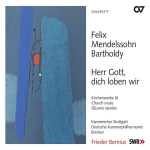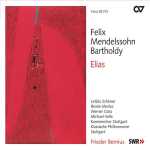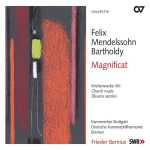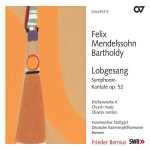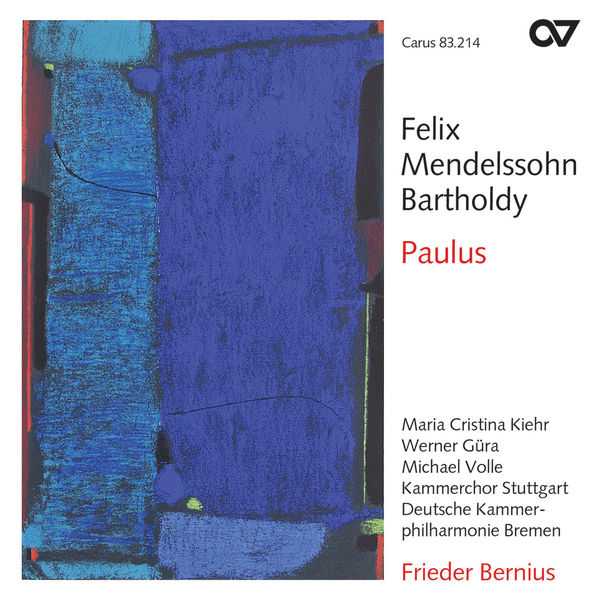
Composer: Felix Mendelssohn
Performer: Maria Cristina Kiehr, Werner Güra, Michael Volle, Kammerchor Stuttgart
Orchestra: Deutsche Kammerphilharmonie Bremen
Conductor: Frieder Bernius
Number of Discs: 2
Format: FLAC (tracks)
Label: Carus
Catalogue: CARUS83214
Release: 2007
Size: 484 MB
Recovery: +3%
Scan: cover
Paulus, Op. 36, MWV A14
CD 01
Part 1
01. No. 1 Ouvertüre
02. No. 2 Chor: “Herr! Der du bist der Gott”
03. No. 3 Choral: “Allein Gott in der Höh’ sei Ehr”
04. No. 4 Rezitativ und Duett: “Die Menge der gläubigen”
05. No. 5 Chor: “Dieser Mensch hört nicht auf”
06. No. 6 Rezitativ: “Und sie sahen auf ihn”
07. No. 7 Arie: “Jerusalem! Die du tötest die Propheten”
08. No. 8 Rezitativ und Chor: “Sie aber stürmten auf ihn ein”
09. No. 9 Rezitativ und Choral: “Und sie steinigten ihn” – “Dir, Herr, dir will ich mich ergeben”
10. No. 10 Rezitativ: “Und die Zeugen legten ab ihre Kleider”
11. No. 11 Chor: “Siehe! Wir preisen selig”
12. No. 12 Rezitativ und Arie: “Saulus aber zerstörte die Gemeinde” – “Vertilge sie, Herr Zebaoth”
13. No. 13 Rezitativ und Arioso: “Und zog mit einer Schar”- “Doch der Herr vergisst der Seinen nicht”
14. No. 14 Rezitativ mit Chor: “Und als er auf dem Wege war
15. No. 15 Chor: “Mache dich auf! Werde Licht!”
16. No. 16 Choral: “Wachet auf! ruft uns die Stimme”
17. No. 17 Rezitativ: “Die Männer aber”
18. No. 18 Arie: “Gott, sei mir gnädig”
19. No. 19 Rezitativ: “Es war aber ein Jünger”
20. No. 20 Arie mit Chor: “Ich danke dir, Herr, mein Gott”
21. No. 21 Rezitativ: “Und Ananias ging hin”
22. No. 22 Chor: “O welch eine Tiefe des Reichtums”
CD 02
Part 2
01. No. 23 Chor: “Der Erdkreis ist nun des Herrn”
02. No. 24 Rezitativ: “Und Paulus kam”
03. No. 25 Duettino: “So sind wir nun Botschafter”
04. No. 26 Chor: “Wie lieblich sind die Boten”
05. No. 27 Rezitativ und Arioso: “Und wie sie ausgesandt” – “Lasst uns singen von der Gnade”
06. No. 28 Rezitativ und Chor: “Da aber die Juden das Volk sahen”
07. No. 29 Chor und Choral: “Ist das nicht” – “O Jesu Christe”
08. No. 30 Rezitativ: “Paulus aber und Barnabas sprachen”
09. No. 31 Duett: “Denn also hat uns der Herr geboten”
10. No. 32 Rezitativ: “Und es war ein Mann”
11. No. 33 Chor: “Die Götter sind den Menschen gleich geworden”
12. No. 34 Rezitativ: “Und nannten Barnabas”
13. No. 35 Chor: “Sei uns gnädig”
14. No. 36 Rezitativ, Arie und Chor: “Da das die Apostel” – “Ihr Männer, was macht ihr da” – “Wisset ihr nicht” – “Aber unser Gott” – “Wir glauben all an einen Gott”
15. No. 37 Rezitativ: “Da ward das Volk erreget”
16. No. 38 Chor: “Hier ist des Herren Tempel”
17. No. 39 Rezitativ: “Und sie alle verfolgten Paulus”
18. No. 40 Kavatine: “Sei getreu bis in den Tod”
19. No. 41 Rezitativ: “Paulus sandte hin”
20. No. 42 Chor und Rezitativ: “Schone doch deiner selbst”- “Was machet ihr”
21. No. 43 Chor: “Sehet, welche Liebe”
22. No. 44 Rezitativ: “Und wenn er gleich geopfert wird”
23. No. 45 Schlusschor: “Nicht aber ihm allein”
Paulus, Mendelssohn’s two-hour oratorio, is rarely performed today, but during his lifetime it was his most popular work. Elijah is a richer and more musically mature work, and it has a more inherently dramatic story, so it’s not surprising that it has eclipsed Paulus’ popularity. Paulus demonstrates Mendelssohn admiration for the Passions of Bach and the oratorios of Handel, and also his indebtedness to the conventions of those pieces, particularly in the recitatives and in the contrapuntal rigor of some of the choruses. The first half, which deals with Paul’s conversion, is the more dramatic; the composer’s decision to use a four-part women’s choir to voice the words of Jesus was controversial, but is highly effective. The second half deals with Paul’s ministry in generalities, omitting the dramatic narratives from the book of Acts that could have made it truly compelling. While Mendelssohn’s writing only sporadically rises to the highest level of inspiration, the oratorio is never less than lovely, and it is occasionally genuinely powerful and moving. The performance by Kammerchor Stuttgart and Deutsche Kammerphilharmonie Bremen, led by Frieder Bernius, is polished, and makes a strong case for the work, as do the vocal soloists. Maria Cristina Kiehr sings both the soprano and mezzo-soprano solos with pure and focused, if not particularly full tone. Tenor Werner Güra and bass Michael Volle bring strong voices and dramatic intensity to the music. The sound of the Carus SACD is well balanced and notable for its clarity.
